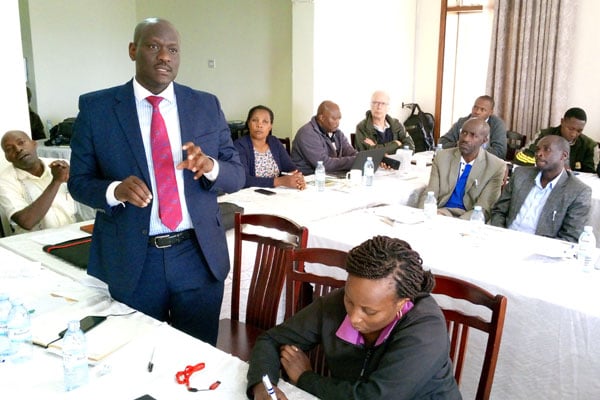Prime
E.African conservationists in joint drive to promote regional smart agriculture

Rubanda district LCV chairman Mr Stephen Kasyaba speaks during a meeting on Climate Smart Agriculture strategies on March 21, 2023 in Kabale town. PHOTO/ ROBERT MUHEREZA.
What you need to know:
- “Embracing agroforestry, organic farming, intensified sustainable production, biodiversity conservation, value chain addition and gender responsiveness can help us attain climate smart agriculture strategies,” the project officer at Nature Tanzania, Ms Scholastica Mbinile said
A section of conservation activists from Uganda, Kenya and Tanzania have entered into a partnership to implement climate smart agriculture activities as one way of protecting the environment from degradation in the East African region.
The conservationists who included officials from Nature Uganda, Nature Kenya and Nature Tanzania held a meeting on Tuesday in Kabale town in Uganda that was attended by local leaders from Rubanda and Kisoro district local governments as well as funders from Germany and United Kingdom as they rooted for pooled labor to ease the adoption of Climate Smart Agriculture strategies.
“Embracing agroforestry, organic farming, intensified sustainable production, biodiversity conservation, value chain addition and gender responsiveness can help us attain climate smart agriculture strategies,” the project officer at Nature Tanzania, Ms Scholastica Mbinile said.
Her counterpart from Nature Kenya, Ms Emily Mateche said they had intensified a campaign against the illegal allocation of Yala swamp measuring about 175 square kilometers on the shores of Lake Victoria in western Kenya to Lake Agro limited for commercial sugarcane production by the national lands commission through social media and the press, as they sensed impending environmental degradation dangers.
“Drought, prevalence of pests and diseases, escalating costs of living nationwide and the planned degradation of Yala wetland are some of the challenges affecting climate smart agriculture activities in Kenya although they continue to implement climate smart livelihood activities such as crop production, fish and honey production, and agroforestry. We have registered an achievement of Kshs5 million per year through the implementation of these climate smart livelihood activities,” the policy and advocacy manager at Nature Kenya Ms Emily Mateche said.
The executive director Nature Uganda Mr Achilles Byaruhanga said they have formed five collaborative forest management groups to protect and conserve Echuya forest reserve that is located between Rubanda and Kisoro districts that fact that it’s the only remaining water catchment area for the all the water bodies in the region including Lake Bunyonyi besides being the habitat for the world's most endangered bird species of Grauer’s swamp warbler, dozens of baboon species, bamboo forest cover and over 300 bird species.
“We have formed climate smart farmer schools in Kisoro and Rubanda districts to attract the youth in conservation activities by establishing environment clubs in primary and secondary schools. We have also established agroforestry nursery beds of bamboo and other tree species as a way of domesticating them to reduce pressure on the ecology of Echuya forest reserve. We are also promoting the digging of trenches in crop gardens to reduce the speed of running water that destroys crop gardens during the rainy seasons, bee keeping, rearing of domestic animals such as goats and sheep which generates organic manure required for crop production besides promoting energy saving technologies although limited land remains the biggest challenge to climate smart agricultural technologies,”Mr Byaruhanga said.
The LCV chairman for Rubanda district, Mr Stephen Kasyaba and his Kisoro district counterpart Mr Abel Bizimana hailed the conservationists for their partnership in implementing Climate Smart Agricultural technologies in the region and promised all the required support for the successful implementation of their planned activities.
“We value the efforts of the conservationists of promoting Climate Smart Agricultural technologies because they supplement government programs of conserving our environment. It is our recommendation that Echuya forest reserve should be turned into a national park so that the fauna and flora in this forest are fully protected from any forms of degradation,” the Kisoro district LCV chairman Mr Abel Bizimana said.




